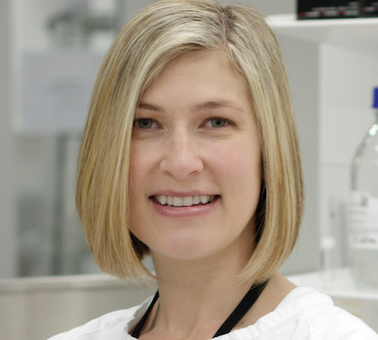
Where Are They Now? Catching Up With NIH Oxford-Cambridge/Wellcome Trust Scholars: Dr. Kristina Cook
In August, we shared with you a video made in 2009 highlighting the NIH Oxford-Cambridge Scholars Program. Where are those program alumni now, ten years later? How has the program and the support from the Alliance helped shape their careers? We reached out to each of the alumni interviewed in the original (somewhat fuzzy by today’s standards) video to share with you their continuing stories, starting with Kristina Cook.
Kristina Cook completed her DPhil in 2009 in Christopher Schofield’s lab (Oxford) and William (Doug) Figg’s lab (NIH/NCI). Her thesis focused on inhibiting an oxygen sensing pathway to develop novel anti-cancer drugs. Low-oxygen (hypoxic) environments are a universal hallmark of all solid cancers. Cancer cells exploit this environment to activate a transcription factor known as hypoxia inducible factor or HIF, which increases metastasis and chemotherapy resistance. Kristina’s collaborative DPhil project identified a new mechanism for inhibiting HIF and set up a high throughput screen at the NIH to identify a number of new HIF inhibitors.
During Kristina’s time in Oxford, she met her partner and now husband, who is Australian. When she finished her DPhil, Kristina moved to Sydney and took up a post-doc in a new area of research studying post-translational modifications of proteins.
Kristina explained: “I enjoyed the work and developed new skills, but ultimately my love of hypoxia came calling. I was lucky to secure fellowships and started my own lab in this area in 2017. In addition to continuing the work on tumor hypoxia and HIF inhibitors, my lab has an interesting project on obstructive sleep apnea (hypoxia!) and cancer. We’ve also started an exciting project on circadian rhythms and hypoxia. My nerdy side was really excited to see two Science papers come out this year on a new oxygen sensing pathway independent of HIF and we have started work in this area as well.”
“I absolutely loved my time in the NIH OxCam program. Studying alongside some the world’s greatest researchers at renowned institutions is hard to beat, but the NIH OxCam program is so much more than that. One unique aspect of the program was the leadership and mentoring components. Top-notch science isn’t the only important quality for running a lab, and skills in leadership, mentoring and team-building are equally important. The NIH OxCam program had a strong focus on developing these qualities and they have served me well as I build my team. It is fantastic that the NIH OxCam program prepares their students to be future leaders and mentors. When we build strong teams in a supportive environment, we have the best chance at making ground-breaking discoveries and changing clinical outcomes. I made many lifelong friends in the OxCam program and these friendships were essential to getting through graduate school. We still like to catch up through Skype today.”
Kristina lives in beautiful Sydney, Australia. Kristina, her husband, and their four-year-old son love going to the beach and spend every weekend there in the summer (making us all jealous as Australia’s summer is during our winter). They love to travel as a family and have been to many places including Vietnam, Thailand, Hawaii, Mexico, and the U.S.

